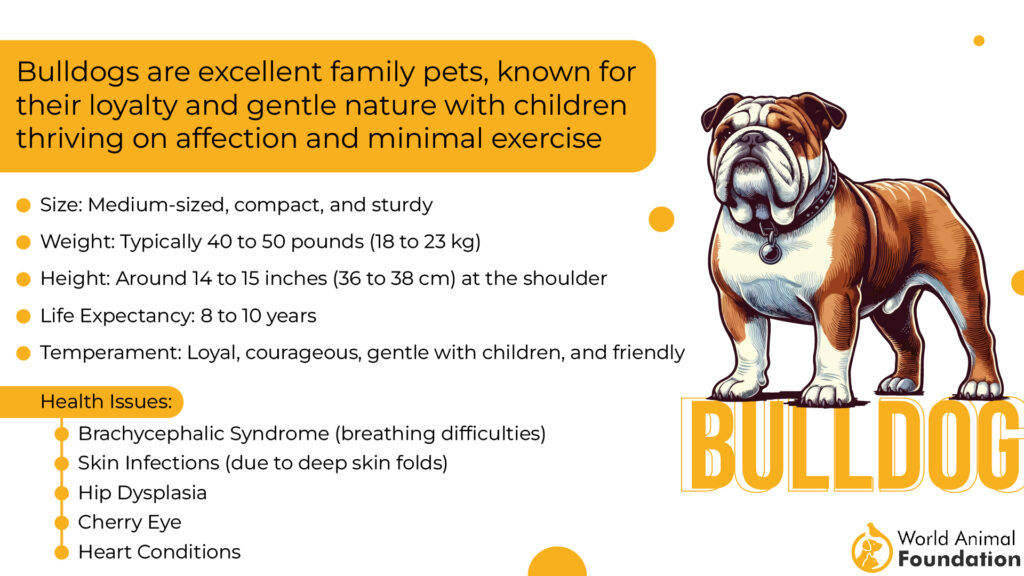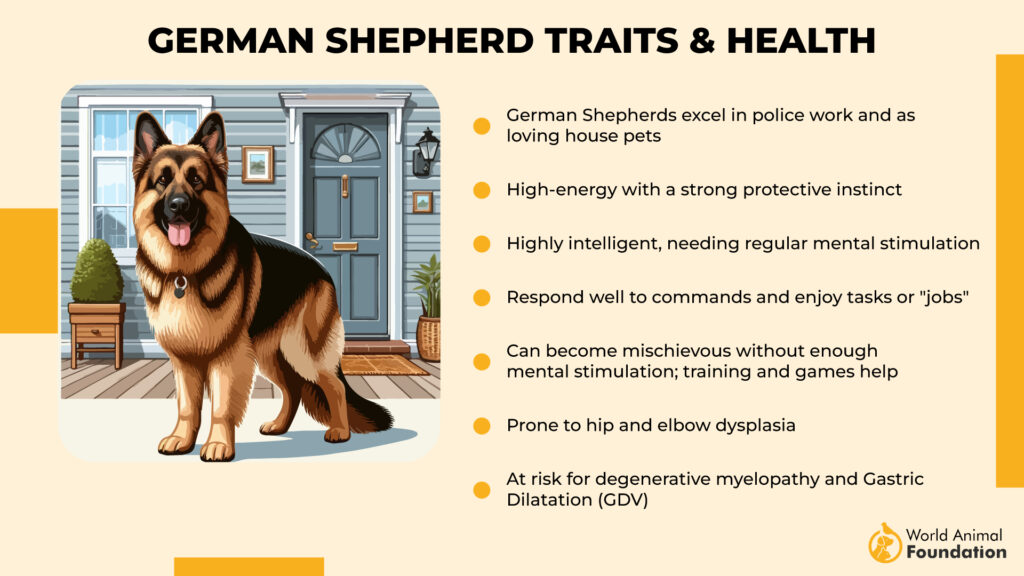In the world of canine companions, not all breeds are created equal when it comes to health and longevity. While every dog deserves a loving home, some breeds are more prone to specific health issues, leading to frequent vet visits and extensive care requirements. Understanding these predispositions can be crucial for current and prospective dog owners, enabling them to make informed decisions and provide the best possible care for their pets. In this article, we delve into seven dog breeds that are notably susceptible to health problems, offering insights and tips for managing these challenges to ensure a happier, healthier life for your furry friend.
Did you know that 60% of dogs suffer from at least one major health issue throughout their lifetime?
While many dog breeds are relatively healthy, others are more prone to genetic disorders and health problems, leading to a shorter lifespan and higher veterinary costs. Some breeds are particularly susceptible to issues like hip dysplasia, respiratory problems, and heart disease, which can make caring for them more challenging.
Whether you’re a dog owner or considering adopting a furry friend, it’s essential to understand the health risks associated with different breeds. In this article, we’ll dive into the unhealthiest dog breeds and the common health issues they face. So, let’s start!
Sickly Dog Breeds
1. Great Dane
Quick Facts
-
Known for: Massive size and gentle temperament.
-
Temperament: Calm, friendly, good with families.
-
Life span: 7-10 years.
Great Danes are known for their impressive size, but this also makes them prone to certain health problems. Due to their large frames, they often experience hip and elbow dysplasia, which can lead to joint problems and discomfort.
This breed is also at risk for blood vessel birth defects, which may require medical attention. Frequent ear infections are common, especially because their large floppy ears can trap moisture, leading to bacterial growth as mentioned in PetMD.
While these health issues are serious, with proper care, Great Danes can still live a happy and healthy life. Regular vet visits and a balanced diet are key to managing their health. Though they are prone to health concerns, their affectionate nature and loyalty make them excellent companions for families.
2. French Bulldog
Quick Facts
-
Known for: Their playful nature and affectionate companionship.
-
Temperament: Loyal, friendly, and often a bit of a clown—great for families.
-
Life span: Typically lives between 10-12 years.
The French Bulldog is a small yet lovable companion, but unfortunately, certain health concerns often come with the breed. These dogs are particularly vulnerable to breathing problems due to their brachycephalic skull structure, leading to conditions like brachycephalic airway syndrome (BAS). This can cause snoring, heavy panting, and even difficulty breathing, particularly during exercise.
Furthermore, hip dysplasia is a common issue in these little dogs, resulting in joint pain and mobility issues over time. French Bulldogs are also prone to skin allergies, which can lead to irritation, hot spots, or rashes, particularly in areas with folds of skin.
To help maintain their healthy life, regular vet check-ups are crucial, as well as a clean, dry environment to prevent ear infections. Proper diet and preventive care can also reduce the likelihood of some of these conditions, ensuring that these affectionate companions live a happy, active life.
3. Pug
Quick Facts
-
Known for: Small size and playful personality.
-
Temperament: Affectionate, outgoing, and loves to be around people.
-
Life span: 12-15 years.
Pugs are beloved for their charming personalities and distinctive appearance, but like many certain dog breeds, they can face some health problems. One of the most concerning issues for Pugs is their breathing problems, which are often caused by their brachycephalic airway syndrome as per PDSA.
Due to their short snouts, these dogs tend to struggle with normal breathing, especially in hot weather. Pugs also tend to be at a higher risk of developing mast cell tumors, a form of cancer that affects their skin. While these health concerns are serious, veterinary medicine has made great strides in helping Pugs live longer, healthier lives.
Selective breeding can sometimes contribute to these issues, but with proper care, Pugs can thrive in loving homes. Regular vet checkups and monitoring for breathing issues are essential for their health.
4. Doberman Pinscher
Quick Facts
-
Known for: Sleek, muscular build and high intelligence.
-
Temperament: Loyal, alert, and protective.
-
Life span: 10-12 years.
Dobermans are known for their loyalty and intelligence, but like many large breeds, they’re prone to certain diseases. One of the most common health issues for Dobermans is eye problems, such as progressive retinal atrophy, which can lead to blindness.
In addition to eye conditions, they are also at risk for genetic conditions like lymphoma, a type of cancer that affects the lymphatic system. While specific health problems like these can be challenging, they can often be managed with early detection and proper care.
Regular vet visits are key to spotting issues before they become serious. Dobermans are also prone to other health problems such as joint issues and heart conditions, so maintaining a healthy lifestyle and regular exercise is important to support their overall well-being.
5. German Shepherd
Quick Facts (120 words)
-
Known for: Intelligence, loyalty, and versatility in various working roles.
-
Temperament: Courageous, confident, and protective.
-
Life span: 9-13 years.
German Shepherds are among the most popular dog breeds worldwide, prized for their intelligence and loyalty. However, these noble dogs come with their own set of health concerns.
German Shepherds are particularly prone to breathing difficulties, such as those related to their deep-chested build, which can make them more susceptible to bloat—a life-threatening condition where the stomach twists as per Purina. They also face a higher risk of hip dysplasia and other joint problems, which can lead to dog collapses or severe mobility issues if left untreated.
To maintain a healthy weight and support their joints, it’s essential to provide a balanced diet and regular, controlled exercise. As giant breeds, their size contributes to a greater risk for certain health issues, but with proper care and early intervention, of course, they can live a long, healthy life.
6. Cavalier King Charles Spaniel
Quick Facts
-
Known for: Affectionate, gentle, and friendly nature.
-
Temperament: Loving, playful, and social.
-
Life span: 9-14 years.
The Cavalier King Charles Spaniel is known for its loving and affectionate nature, making it one of the best canine companions for families. However, this sweet breed is vulnerable to several common health problems.
Bone cancer and liver disease are among the more serious conditions that may affect this breed, often due to genetic factors. It’s essential to choose a reputable breeder who prioritizes the health of the puppies by screening them for genetic disorders.
Additionally, Cavaliers can suffer from heart problems, including mitral valve disease, which is common in older dogs. Regular vet checkups and early intervention can help manage these issues, allowing your Cavalier to enjoy a healthy life.
7. Boxer
Quick Facts
-
Known for: Energetic, playful, and protective personality.
-
Temperament: Loyal, affectionate, and confident.
-
Life span: 10-12 years.
The Boxer is known for its high energy and affectionate nature, making them excellent family companions. However, like many certain breeds, they can face health problems due to their unique physical traits. As a brachycephalic breed, they may experience breathing difficulties, especially in hot weather or during intense exercise.
Boxers are also prone to intervertebral disc disease, a condition that affects the spine and can lead to mobility issues. They are also at higher risk for autoimmune disorders, which can impact their overall health and longevity.
Even a dog with such an exuberant personality requires attention to their health needs to ensure they live a long and healthy life. Obviously, proper care, including a balanced diet, regular exercise, and routine vet visits, can help mitigate these concerns and keep your Boxer in great shape.
Conclusion
In conclusion, while breeds like the English Bulldog, Cocker Spaniels, and Boxers may face health issues due to their genetic makeup or physical traits, they can still live a fulfilling, happy life with proper care.
Whether you’re considering a brachycephalic breed like the Bulldog or a more energetic one like the Boxer, it’s important to be aware of their health concerns. With regular veterinary check-ups, a balanced diet, and proper exercise, various dog breeds can overcome many challenges and enjoy a long, healthy life by your side.
In conclusion, understanding the common health issues associated with certain dog breeds is crucial for potential and current pet owners. While breeds like Bulldogs, Dachshunds, and Pugs may face genetic predispositions to specific ailments, informed care and regular veterinary check-ups can significantly enhance their quality of life. Prospective owners should weigh the responsibilities and potential challenges of adopting these breeds, ensuring they are prepared to meet their unique health needs. By prioritizing preventative care, proper nutrition, and adequate exercise, pet owners can help mitigate some health risks, leading to happier, healthier lives for these beloved companions.










